- Clone
- HK1.4 (See other available formats)
- Regulatory Status
- RUO
- Other Names
- Lymphocyte antigen 6 complex, locus C
- Isotype
- Rat IgG2c, κ
- Ave. Rating
- Submit a Review
- Product Citations
- publications
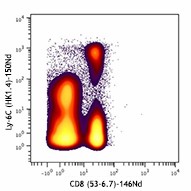
-

Mouse splenocytes stained with 150Nd-anti-Ly-6C (HK1.4) and 146Nd-anti-CD8 (53-6.7). T lymphocytes are displayed in the analysis. Data provided by DVS Sciences.
| Cat # | Size | Price | Quantity Check Availability | Save | ||
|---|---|---|---|---|---|---|
| 128039 | 100 µg | 100€ | ||||
Most hematopoietic cells express one or more members of Ly-6 family. The expression of Ly-6 varies with development stage and activation. Ly-6C is a 14-17 kD GPI-linked surface protein expressed on mouse monocyte/macrophage cells, endothelial cells, neutrophils, and some T cell subsets. Ly-6C is reported to be an indicator of memory CD8+ T cells.
Product DetailsProduct Details
- Verified Reactivity
- Mouse
- Antibody Type
- Monoclonal
- Host Species
- Rat
- Immunogen
- L3 cloned CTL cells
- Formulation
- Phosphate-buffered solution, pH 7.2, containing 0.09% sodium azide and EDTA.
- Preparation
- The antibody was purified by affinity chromatography.
- Concentration
- 1.0 mg/ml
- Storage & Handling
- The antibody solution should be stored undiluted between 2°C and 8°C.
- Application
-
FC - Quality tested
CyTOF® - Verified - Recommended Usage
-
This product is suitable for use with the Maxpar® Metal Labeling Kits. For metal labeling using Maxpar® Ready antibodies, proceed directly to the step to Partially Reduce the Antibody by adding 100 µl of Maxpar® Ready antibody to 100 µl of 4 mM TCEP-R in a 50 kDa filter and continue with the protocol. Always refer to the latest version of Maxpar® User Guide when conjugating Maxpar® Ready antibodies.
- Application Notes
-
Clone HK1.4 does not block the binding of clone RB6-8C58.
Additional reported applications (for relevant formats of this clone) include: in vitro activation of T cells1-3 and immunohistochemistry of frozen sections4. - Additional Product Notes
-
Maxpar® is a registered trademark of Standard BioTools Inc.
- Application References
-
- Jutila MA, et al. 1988. Eur. J. Immunol. 18:1819. (Activ)
- Herold KC, et al. 1990. Diabetes 39:815. (Activ)
- Havran WL, et al. 1988. J. Immunol. 140:1034 (Activ)
- Flanagan K, et al. 2008. J. Immunol. 180:3874. (IHC)
- Makaroff LE, et al. 2009. P. Natl. Acad. Sci. USA 106:4799. (FC)
- Zuber J, et al. 2009. Genes Dev. 23:877. (FC) PubMed
- Ribechini E, et al. 2009. Eur. J. Immunol. 39:3538.
- Ma C, et al. 2012. J. Leukoc. Biol. 92:1199.
- Watson NB, et al. 2015. J Immunol. 194:2796. PubMed
- Product Citations
-
- RRID
-
AB_2563783 (BioLegend Cat. No. 128039)
Antigen Details
- Structure
- 14-17 kD protein (134 amino acids), member of the Ly-6 family of GPI linked protein. Ly6 family members share structure homology throughout a distinctive cystein rich protein domain that incorporates O-linked carbohydrates.
- Distribution
-
Ly-6C is expressed primarily on bone marrow myeloid populations, monocytes/macrophages, neutrophils, endothelial cells, and some T cell subsets. Ly-6C is also a marker of memory CD8+ T cells.
- Cell Type
- Endothelial cells, Macrophages, Monocytes, Neutrophils, T cells
- Biology Area
- Immunology
- Molecular Family
- CD Molecules
- Antigen References
-
1. Jutila MA, et al. 1988. Eur. J. Immunol. 18:1819.
2. Cerwenka A, et al. 1998. J. Immunol. 161:97. - Gene ID
- 17067 View all products for this Gene ID
- UniProt
- View information about Ly-6C on UniProt.org
Related Pages & Pathways
Pages
Related FAQs
- Can I obtain CyTOF data related to your Maxpar® Ready antibody clones?
-
We do not test our antibodies by mass cytometry or on a CyTOF machine in-house. The data displayed on our website is provided by Fluidigm®. Please contact Fluidigm® directly for additional data and further details.
- Can I use Maxpar® Ready format clones for flow cytometry staining?
-
We have not tested the Maxpar® Ready antibodies formulated in solution containing EDTA for flow cytometry staining. While it is likely that this will work in majority of the situations, it is best to use the non-EDTA formulated version of the same clone for flow cytometry testing. The presence of EDTA in some situations might negatively affect staining.
- I am having difficulty observing a signal after conjugating a metal tag to your Maxpar® antibody. Please help troubleshoot.
-
We only supply the antibody and not test that in house. Please contact Fluidigm® directly for troubleshooting advice: http://techsupport.fluidigm.com/
- Is there a difference between buffer formulations related to Maxpar® Ready and purified format antibodies?
-
The Maxpar® Ready format antibody clones are formulated in Phosphate-buffered solution, pH 7.2, containing 0.09% sodium azide and EDTA. The regular purified format clones are formulated in solution that does not contain any EDTA. Both formulations are however without any extra carrier proteins.
Other Formats
View All Ly-6C Reagents Request Custom ConjugationCustomers Also Purchased
Compare Data Across All Formats
This data display is provided for general comparisons between formats.
Your actual data may vary due to variations in samples, target cells, instruments and their settings, staining conditions, and other factors.
If you need assistance with selecting the best format contact our expert technical support team.
-
Pacific Blue™ anti-mouse Ly-6C
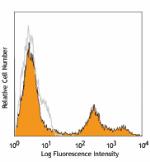
C57BL/6 mouse bone marrow cells stained with HK1.4 Pacific B... -
APC anti-mouse Ly-6C
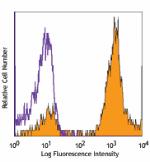
C57BL/6 bone marrow cells stained with HK1.4 APC -
Purified anti-mouse Ly-6C
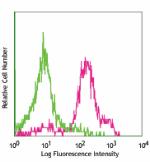
C57BL/6 mouse bone marrow cells stained with purified HK1.4,... 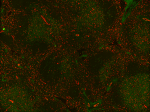
Fresh, frozen mouse spleen was stained with purified Ly6C cl... -
Biotin anti-mouse Ly-6C
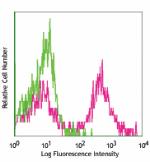
BALB/c bone marrow cells stained with HK1.4 biotin, followed... -
FITC anti-mouse Ly-6C
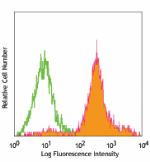
C57BL/6 bone marrow cells stained with HK1.4 FITC (gated on ... -
Alexa Fluor® 647 anti-mouse Ly-6C
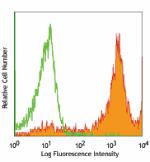
BALB/c bone marrow cells stained with HK1.4 Alexa Fluor®... -
PE anti-mouse Ly-6C
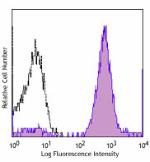
C57BL/6 bone marrow cells were stained with Ly-6C (clone HK1... -
PerCP/Cyanine5.5 anti-mouse Ly-6C
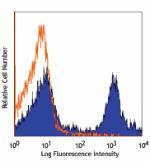
C57BL/6 bone marrow cells stained with HK1.4 PerCP/Cyanine5.... -
PE/Cyanine7 anti-mouse Ly-6C
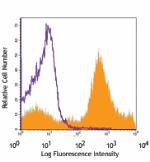
C57BL/6 bone marrow cells stained with HK1.4 PE/Cyanine7 -
Alexa Fluor® 488 anti-mouse Ly-6C
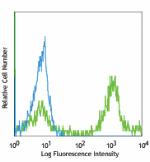
C57BL/6 bone marrow cells stained with anti-mouse Ly-6C, HK1... -
Alexa Fluor® 700 anti-mouse Ly-6C
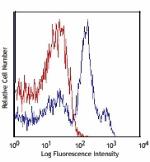
C57BL/6 bone marrow cells stained with HK1.4 Alexa Fluor®... -
APC/Cyanine7 anti-mouse Ly-6C

C57BL/6 mouse bone marrow cells were stained with CD8a FITC ... -
PerCP anti-mouse Ly-6C
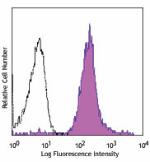
C57BL/6 bone marrow cells were stained with Ly-6C (clone HK1... -
Brilliant Violet 570™ anti-mouse Ly-6C
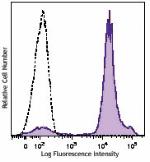
C57BL/6 bone marrow cells were stained with Ly-6C (clone HK1... -
Brilliant Violet 421™ anti-mouse Ly-6C
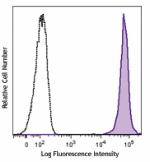
C57BL/6 mouse bone marrow cells were stained with Ly-6C (clo... -
Brilliant Violet 510™ anti-mouse Ly-6C
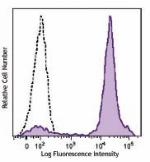
C57BL/6 mouse bone marrow cells were stained with Ly-6C (clo... -
Brilliant Violet 605™ anti-mouse Ly-6C
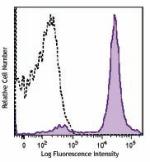
C57BL/6 mouse bone marrow cells were stained with Ly-6C (clo... -
Brilliant Violet 711™ anti-mouse Ly-6C
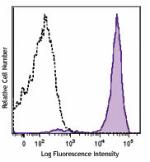
C57BL/6 mouse bone marrow cells were stained with Ly-6C (clo... -
Purified anti-mouse Ly-6C (Maxpar® Ready)
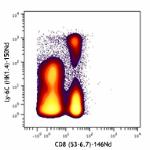
Mouse splenocytes stained with 150Nd-anti-Ly-6C (HK1.4) and ... -
Brilliant Violet 785™ anti-mouse Ly-6C
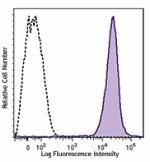
C57BL/6 mouse bone marrow cells were stained with Ly-6C (clo... -
PE/Dazzle™ 594 anti-mouse Ly-6C
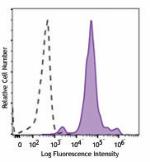
C57BL/6 mouse bone marrow cells were stained with Ly-6C (clo... -
APC/Fire™ 750 anti-mouse Ly-6C
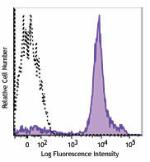
C57BL/6 mouse bone marrow cells were stained with Ly-6C (clo... -
TotalSeq™-A0013 anti-mouse Ly-6C
-
Brilliant Violet 650™ anti-mouse Ly-6C

C57BL/6 mouse splenocytes were stained with CD8 FITC and Ly-... -
TotalSeq™-C0013 anti-mouse Ly-6C
-
TotalSeq™-B0013 anti-mouse Ly-6C
-
APC/Fire™ 810 anti-mouse Ly-6C Antibody

C57BL/6 mouse splenocytes were stained with anti-mouse CD8a ... -
Spark UV™ 387 anti-mouse Ly-6C

C57BL/6 mouse splenocytes were stained with anti-mouse CD8a ... -
PE/Fire™ 810 anti-mouse Ly-6C

C57BL/6 mouse splenocytes were stained with anti-mouse CD8a ... -
Spark Blue™ 550 anti-mouse Ly-6C (Flexi-Fluor™)
-
Spark Blue™ 574 anti-mouse Ly-6C (Flexi-Fluor™)
 Login / Register
Login / Register 










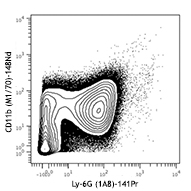
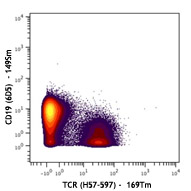
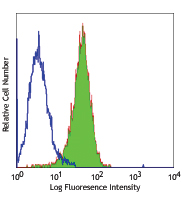



Follow Us